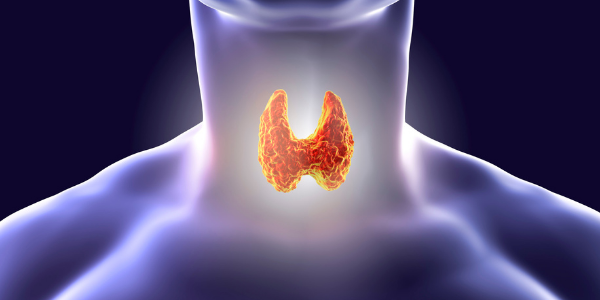
How are Thyroid Hormones Made?

The thyroid produces two hormones, triiodothyronine (T3) and thyroxine (T4). These hormones are crucial to the function of the body.
Thyroid hormones contribute to:
- Supporting the metabolism
- Regulating body temperature
- Maintaining skin, hair, and bone
- Regulating heart rate
- Encouraging the digestive process
But how are thyroid hormones made? Read on to learn more about the importance of iodine in the hormone-making process.
Thyroid Hormone Production
Thyroid hormones are created by adding or removing iodine from substances produced by the thyroid gland.
The thyroid collects iodine from the blood. Then a protein called thyroglobulin reacts with the stored iodine to create precursors, or chemicals used to produce thyroid hormones. These precursors are called iodotyrosines, which include monoiodotyrosine and diiodotyrosine.
Two iodotyrosine molecules combine to make the thyroid hormone thyroxine (T4). Roughly 20% of the daily triiodothyronine (T3) supply is created this way, as well.
The other 80% of T3 is produced from T4. This process is called deiodination, or the removal of iodine. Once iodine is removed from T4, it converts to T3. Only a small amount of T3 is secreted directly from the thyroid, which primarily secretes T4.
The process of deiodination is critical for reaching healthy T3 levels.
Dietary Sources of Iodine for Thyroid Hormone Production
The body doesn’t produce iodine, which means we have to get it from our diet. If we don’t get enough, iodine deficiency can affect thyroid health and hormone production.
Sources of iodine in our food include:
- Fish and shellfish
- Iodized table salt (iodine was added to salt help address iodine deficiency)
- Dairy products like milk and cheese
- Eggs
- Chicken
You can also access high-quality supplements to ensure your iodine levels are within a healthy range.

Deiodination and Thyroid Hormone Replacement Therapy
Hypothyroidism (underactive thyroid) is typically treated with Thyroid Hormone Replacement Therapy. Most times, supplementing with T4 is enough, because the body converts T4 to T3.
However, patients who struggle with the process of deiodination may continue to experience symptoms of hypothyroidism if they’re only supplementing with T4. That’s because their body has a difficult time converting T4 to T3.
In those cases, T3 or a combination of T3 and T4 may provide better results.
Medication Options for Thyroid Hormone Replacement Therapy
Patients with hypothyroidism have a few options for medication. First, there are synthetic hormones versus desiccated hormones.
- Synthetic thyroid hormones are structurally identical to the thyroid hormones found in the body. This allows them to function in a very similar way. There are synthetic hormones for both T3 and T4.
- Desiccated thyroid hormones are created from thyroid tissue, usually from pigs. Due to its source, desiccated medication typically contains a combination of T3 and T4 hormones.
There are also brand name and compounded medication options:
- Armour Thyroid – A desiccated thyroid hormone medication
- Synthroid – A synthetic thyroid hormone medication
Compounded medication options exist for both synthetic and desiccated thyroid hormones. Levothyroxine is synthetic T4, and Liothyronine is synthetic T4.
Thyroid Supplements
In addition to Thyroid Hormone Replacement Therapy, there are also supplements that can support thyroid health.
Iodine deficiency can cause swelling (goiter) and hypothyroid symptoms. Supplementing Iodine can ease iodine deficiency symptoms and support thyroid health.
Defy Medical offers access to two high-quality iodine supplements:
- iThroid — This supplement contains a balance of free elemental iodine and regular iodine, which can be more effective.
- Life Extension’s Sea-Iodine™ — This supplement contains iodine from organic marine algae for a higher quality nutrition.
Other supplements that can support thyroid health include:
- Zinc — This micronutrient is also required for the production of hormones.
- Selenium — This nutrient helps protect the thyroid for damage and oxidative stress.
- Iron — This nutrient is necessary for the body to convert T4 to T3.
- B Vitamins — B vitamins also play a role in hormone production, as well as many important functions throughout the body.

Thyroid Hormone Replacement Therapy with Defy Medical
Now you know how thyroid hormones are made, and how to address potential thyroid issues.
Defy Medical offers treatment for hypothyroidism and hyperthyroidism to help patients feel better, have more energy, and bring their body into balance.
We also offer access to affordable blood testing to help diagnose thyroid disease. Many patients who have a thyroid condition don’t realize it, even though they may be feeling symptoms like fatigue, weight gain, dry skin, brittle hair, and others.
Ready to prioritize your thyroid health?
Get Started


